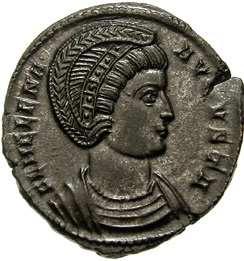St Helena, St Albert Hurtado SJ

Empress. Helena was an innkeeper's daughter, born at Drepanum (later Helenopolis) in Asia Minor, around 270. Another story claims she was born in Britain and was the daughter of King Cole. She married the Roman general Constantius Chlorus, but when he became emperor in 292 he divorced her for political reasons. After his death, their son, who was to become the Emperor Constantine, reinstated his mother and showed her great respect. Coins were minted in her honour.
In about 312, when she was over 60, St Helena became a Christian. She was very devout, dressed quietly, and gave generously to the poor and prisoners. She made a lengthy pilgrimage to the Holy Land where she spent large sums of money for the relief of the poor and sick, and founded churches on the sacred sites.
Ambrose, and the 9th century poet Cynewulf, wrote that Saint Helena won renown because she was the mother of the first Christian Emperor and because she is said to have found the True Cross in Jerusalem. Many miracles were attributed to her. St Helena died in 330. Her sarcophagus is in the Vatican Museum.
One hundred and thirty-five monasteries in England are dedicated to her, particularly in the North East. Many places were dedicated to her name, including St Helen's in Lancashire. The Atlantic island of St Helena was named after her, because Spanish sailors discovered it today - her feast day.
Today is also the feast day of St Albert Hurtado SJ
Alberto Hurtado Cruchaga (1901-1952) was a Jesuit priest who gave himself to the poor and marginalised people of Chile. His life-long dedication to social justice and community work was firmly rooted in his love of Jesus Christ.
Hurtado was an ordained Jesuit priest, a qualified lawyer and an energetic social worker, enabling him to defend and promote the rights of the poor in church, in court and in every public sphere. His work still goes on in the organisations he founded - including the Trade Union Association of Chile and Hogar de Cristo, Chile's largest social welfare charity.
He was a prolific writer and intellectual who published three volumes on the labour movement. In 1951, he founded the periodical Mensaje, meaning 'Message', which is still being published today. He died of cancer in Santiago in 1952. He was 51 years old. He is still considered a Chilean national hero. He was beatified on 16 October 1994 by St Pope John Paul II and canonised on 23 October 2005 by Pope Benedict.












